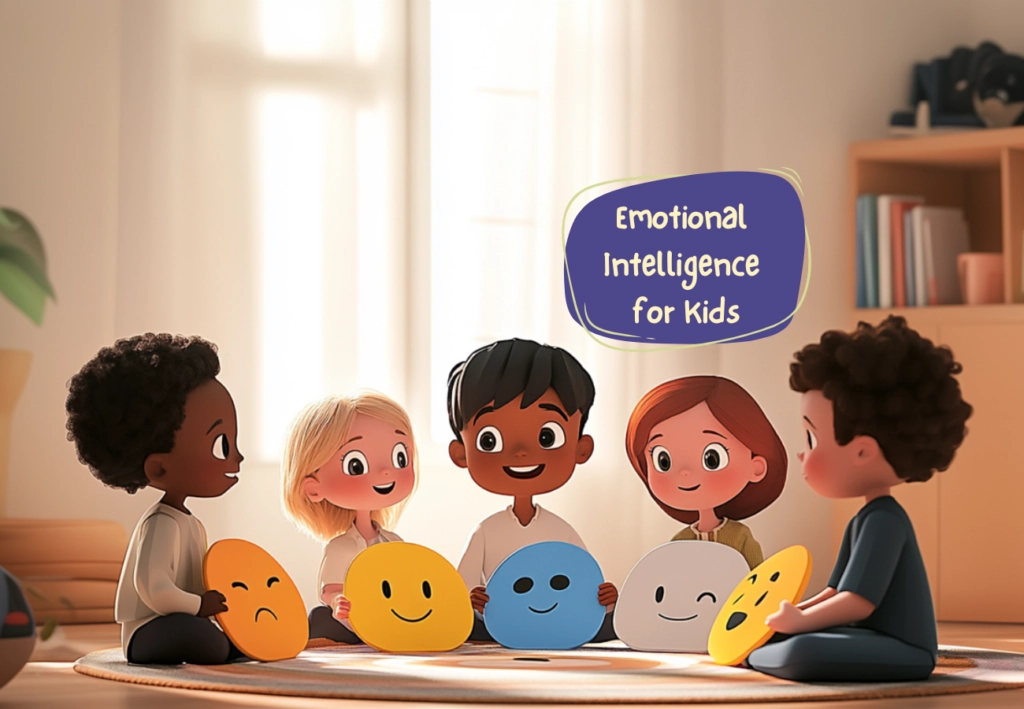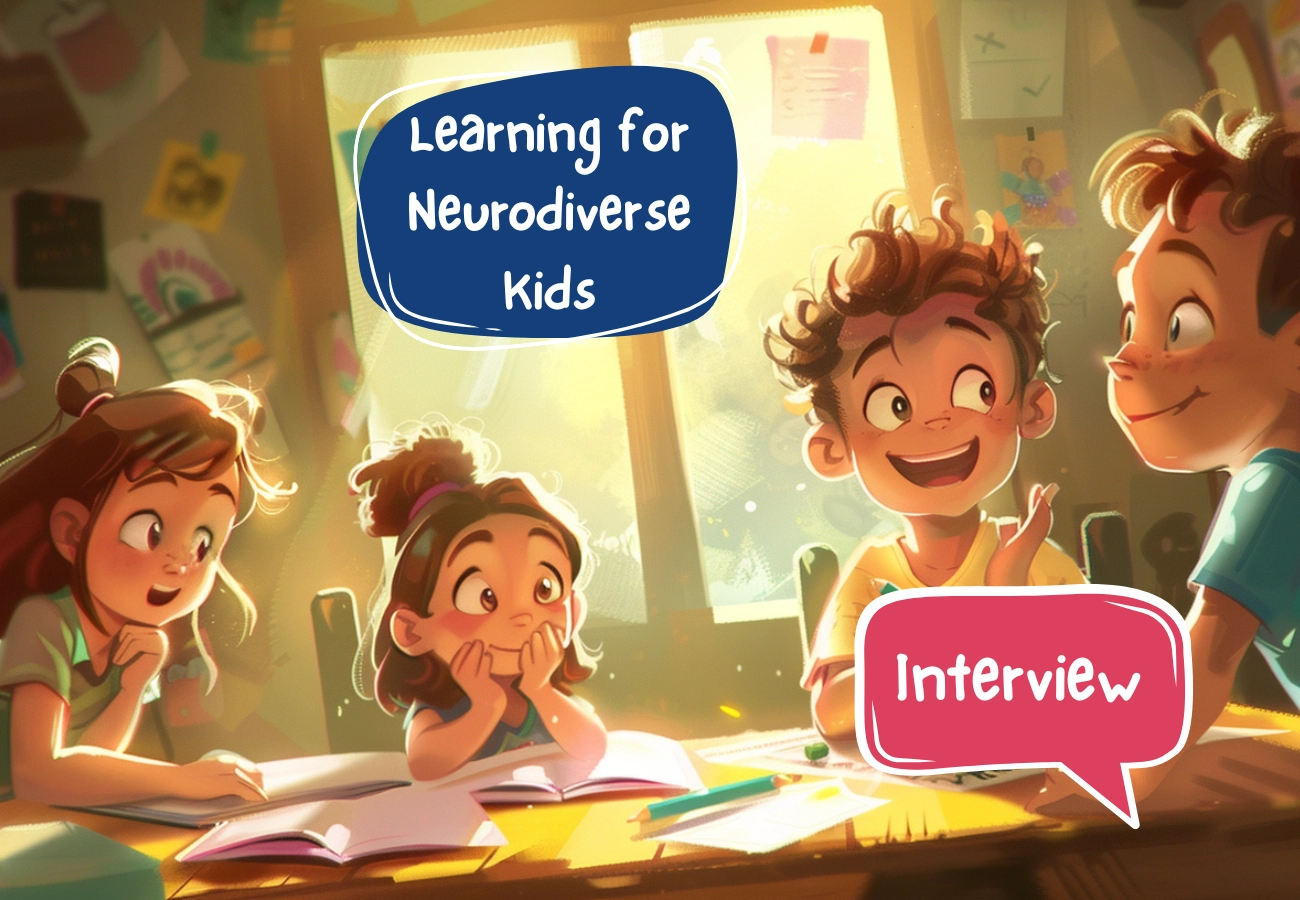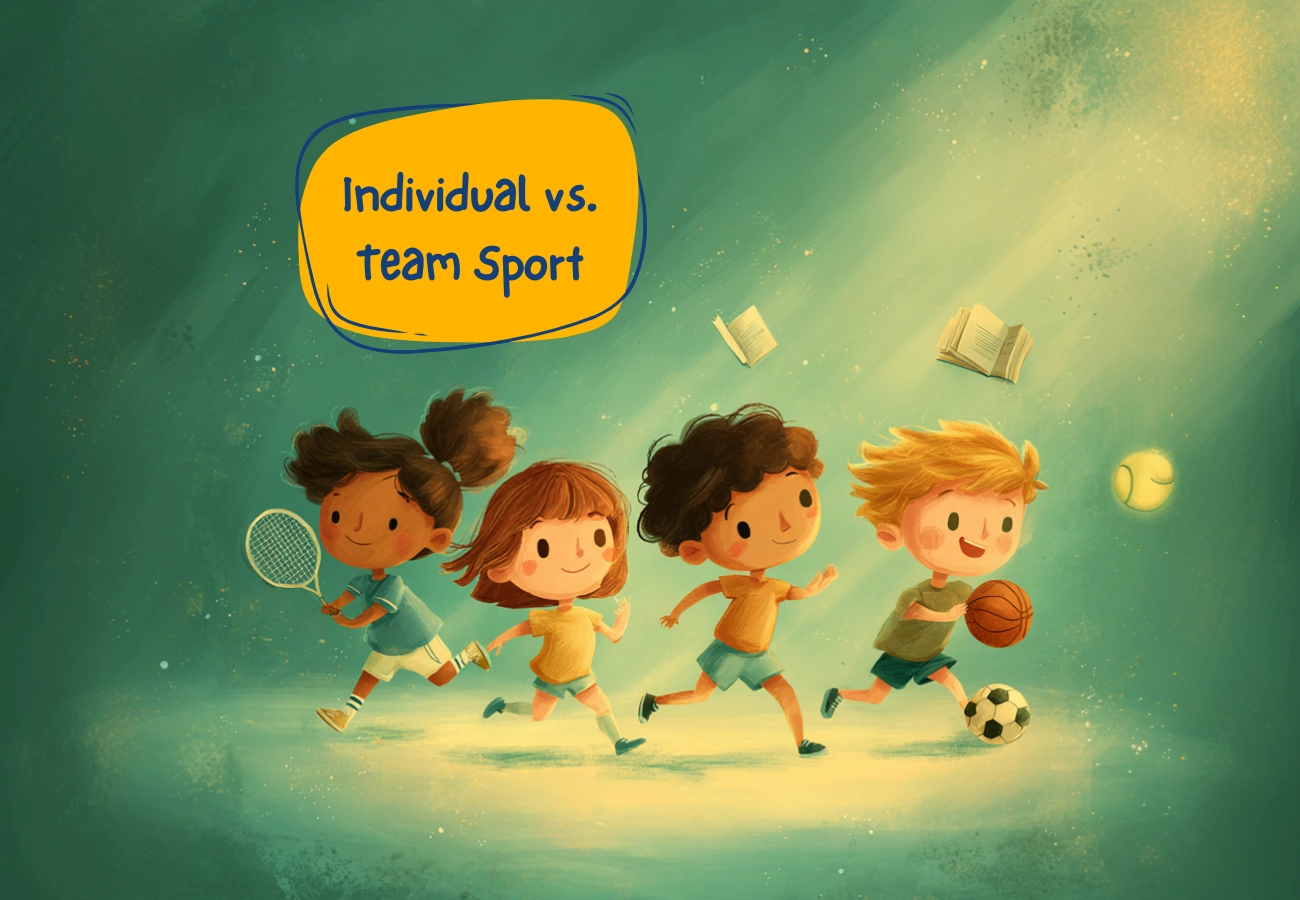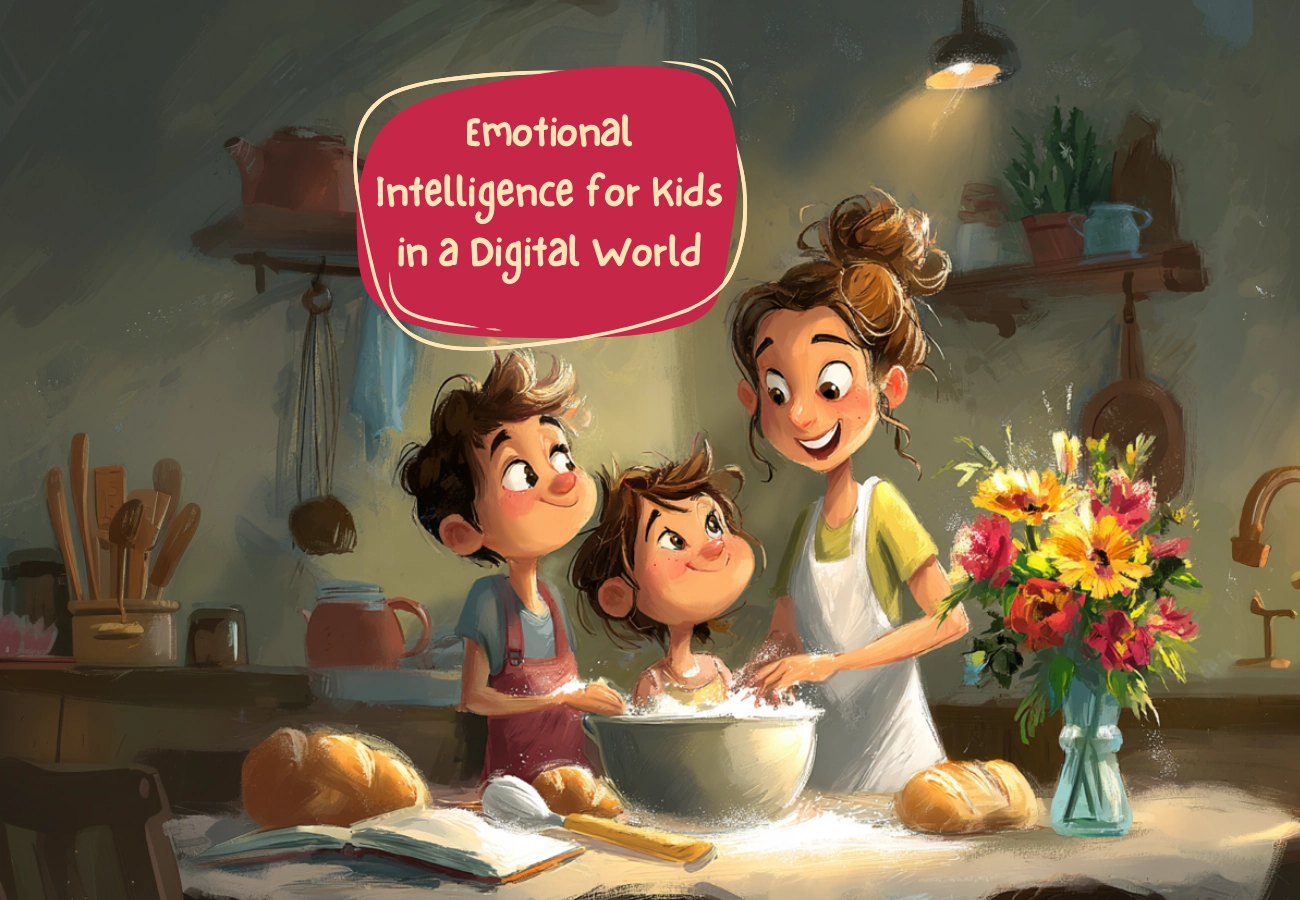Emotional Intelligence for Kids: A Guide to Raising Emotionally Intelligent Children

In today’s fast-paced world, teaching children emotional intelligence is essential. Emotional intelligence (EI) for kids equips them with the skills to understand, manage, and express their emotions, and it enhances their ability to connect with others. This article explores what emotional intelligence is, why it matters, and provides actionable emotional intelligence activities for kids. We’ll also introduce useful equips them with the skills to understand, manage, and express their emotions, and it enhances their ability to connect with others. This article explores what emotional intelligence is and why it matters and provides actionable EI activities for kids. We’ll also introduce useful EI books for kids and worksheets that make building these skills easy and fun.
What is Emotional Intelligence for Kids?
Emotional intelligence refers to the ability to recognize, understand, and manage our own emotions and to empathize with the emotions of others. For kids, this means being aware of how they feel, understanding why they feel that way, and knowing how to manage their emotions constructively. Teaching children EI has lifelong benefits, including better relationships, mental health, and academic success.
Why is Emotional Intelligence Important for Kids?
Studies show that children with strong emotional intelligence are more resilient, communicate better, and tend to build stronger relationships. Additionally, emotional intelligence plays a crucial role in academic performance and can make children more adaptable in social and school environments.
How to Raise an Emotionally Intelligent Child
Raising an emotionally intelligent child is about more than just discipline; it involves teaching children to understand and regulate their emotions. Here are key strategies for parents and educators:
- Model Emotional Intelligence: Show children how to handle emotions by demonstrating calmness and empathy in difficult situations.
- Encourage Open Communication: Make it safe for children to express their feelings without fear of judgment.
- Teach Empathy: Help children recognize how others feel by discussing emotions openly.
- Use Emotional Intelligence Activities for Kids: Engage in hands-on activities that promote EI skills.
Emotional Intelligence Activities for Kids
There are many engaging emotional intelligence activities for kids that can help them recognize, understand, and express their feelings. Here are some ideas to try:
- Feelings Charades: Act out different emotions like happiness, sadness, anger, and ask your child to guess the feeling. This helps children learn to recognize body language and facial expressions.
- Emotion Journals: Encourage kids to write down their emotions and experiences in a journal. This practice helps them process and understand their feelings.
- Role-Playing Scenarios: Use pretend play to show how to respond to emotions in different situations, such as sharing toys or comforting a friend.
- Emotion Vocabulary Building: Use emotion flashcards or worksheets to teach children words for different feelings, which can make it easier for them to communicate emotions.
Emotional Intelligence Skills for Kids
Emotional intelligence skills can be developed over time with consistent practice and reinforcement. Here are some skills that children can learn:
- Self-Awareness: Recognizing one’s own emotions. Teaching children to pause and identify their feelings helps build self-awareness.
- Self-Regulation: Managing emotions in a constructive way. Help children learn calming techniques such as deep breathing.
- Empathy: Understanding others’ emotions. Discuss how their actions may affect others to develop empathy.
- Social Skills: Effective communication and relationship-building. Role-playing can help children practice positive social interactions.
Emotional Intelligence Books for Kids
One of the best ways to introduce EI concepts is through reading. Here are some highly recommended emotional intelligence books for kids:
- Gratitude is My Superpower – Teaches children about the power of gratitude and positivity.
- Breathing is My Superpower – Shows kids how to manage stress and calm themselves in difficult moments.
- Acceptance is My Superpower – Focuses on accepting and celebrating differences in themselves and others.
- Kindness is My Superpower – Encourages kindness, empathy, and understanding.
Books are a great resource for parents and teachers, providing stories that illustrate EI concepts in ways that resonate with young readers.
Emotional Intelligence Worksheets for Kids
Using emotional intelligence worksheets for kids is another practical way to build EI skills. Worksheets can include activities such as:
- Emotion Identification: Matching faces to emotions or filling in an emotion diary.
- Problem-Solving Scenarios: Giving children different situations and asking how they would feel and respond.
- Empathy Building: Worksheets that ask children to imagine how others feel in certain scenarios, encouraging perspective-taking.
Helpful Tools and Resources
For additional support in building emotional intelligence, consider these resources:
- Video Content: Find age-appropriate videos that explain emotional intelligence concepts in a fun, engaging way.
- Apps and Games: There are various apps that teach EI through interactive play. Look for ones that promote mindfulness, empathy, and self-awareness.
- Classroom and Home Activities: Incorporate EI activities into daily routines to keep kids engaged and learning consistently.
Additional Resources for Teaching Emotional Intelligence: Videos, Helpful Links, and Printable Materials
To effectively develop emotional intelligence in kids, it’s helpful to use a mix of practical activities, educational videos, and valuable resources. This section provides links to quality materials you can use at home or in the classroom to enhance emotional intelligence skills for kids.
Videos
“What is Emotional Intelligence?” by Psych Hub
This short but informative video explains the basics of emotional intelligence for kids and how it affects their interactions and overall development.
“Teaching Kids Emotional Intelligence” by Dr. Becky at Good Inside
Dr. Becky shares expert tips and practical activities tailored for parents looking to foster emotional intelligence in their children, providing hands-on strategies for helping kids manage their emotions.
“How to Raise an Emotionally Intelligent Child” by TED-Ed
This animated video emphasizes the importance of building emotional intelligence skills for kids with examples and practical exercises.
Helpful Links and Resources
Mindful Schools
Mindful Schools offers a variety of tools and resources for promoting mindfulness and emotional intelligence activities for kids. It’s an excellent source for parents and educators.
Greater Good in Education
This site offers numerous practical strategies, including structured lessons on emotional intelligence for kids and how to nurture emotional skills in young learners.
GoZen
GoZen is an online platform providing courses to build emotional resilience in children, featuring a wide array of interactive lessons that focus on emotional intelligence skills for kids.
Printable Materials for Parents and Teachers
To make learning even more engaging, here are some free downloadable resources you can use:
- Emotions Journal for Kids
A simple emotions journal template that helps children record their feelings daily, supporting their self-awareness and encouraging emotional reflection. - Emotion Flashcards
Printable flashcards featuring various emotions and scenarios help children expand their emotional vocabulary and learn to articulate their feelings. - “How to Calm Down” Guide for Kids
A printable guide with easy calming exercises, such as deep breathing techniques, to support kids in managing their emotions. - Emotion Vocabulary Poster
A printable poster with basic emotional vocabulary definitions designed to help kids better understand and label their feelings, fostering emotional intelligence development.
These resources not only reinforce what kids learn about emotional intelligence but also give parents and teachers practical tools to support children’s growth in understanding and managing their emotions. Offering these printables as free downloads can encourage readers to subscribe, helping you build a contact list for further engagement.
Final Thoughts: Help Your Child Thrive with Emotional Intelligence
By prioritizing emotional intelligence, parents and teachers help children build the tools they need for a successful future. The more emotional intelligence activities for kids we incorporate into everyday learning, the more these skills will become second nature. And as children grow into emotionally intelligent adults, they’ll be better equipped to face life’s challenges with empathy, resilience, and confidence.
Investing in emotional intelligence for kids is a gift that will benefit them throughout their entire lives.
More articles

Creating Joyful Learning for Neurodiverse Kids: A Homeschooling Mom’s Journey with Alicia Ortego Books
A New Path in Education We always love hearing how our books support children and parents around the world. Recently, we spoke with a mom of three neurodivergent boys and the founder of Backyard Academy. Every day, she looks for creative ways to approach learning and parenting, and she shared with us how Alicia Ortego’s […]

Individual vs. Team Sport Activities for Your Kids: Pros and Cons
Helping children stay active and healthy often starts with sports. But deciding between individual or team sports can be tricky. Each type offers unique experiences and developmental benefits, but also has potential drawbacks. Understanding the differences can help you make informed choices based on your child’s personality, interests, and abilities. What Are Individual Sports? Individual […]

How to Nurture Your Child’s Emotional Intelligence in the Digital Age
Raising children today is nothing like it was in the 90s. Children in the 90s spent the majority of their time playing outdoors with neighbors or going to the local library or the beach. In that era, screen time mostly centered around TV, cable, or video games. But things are quite different in 2025. Kids […]



